Higher Education News
Third-party feeds
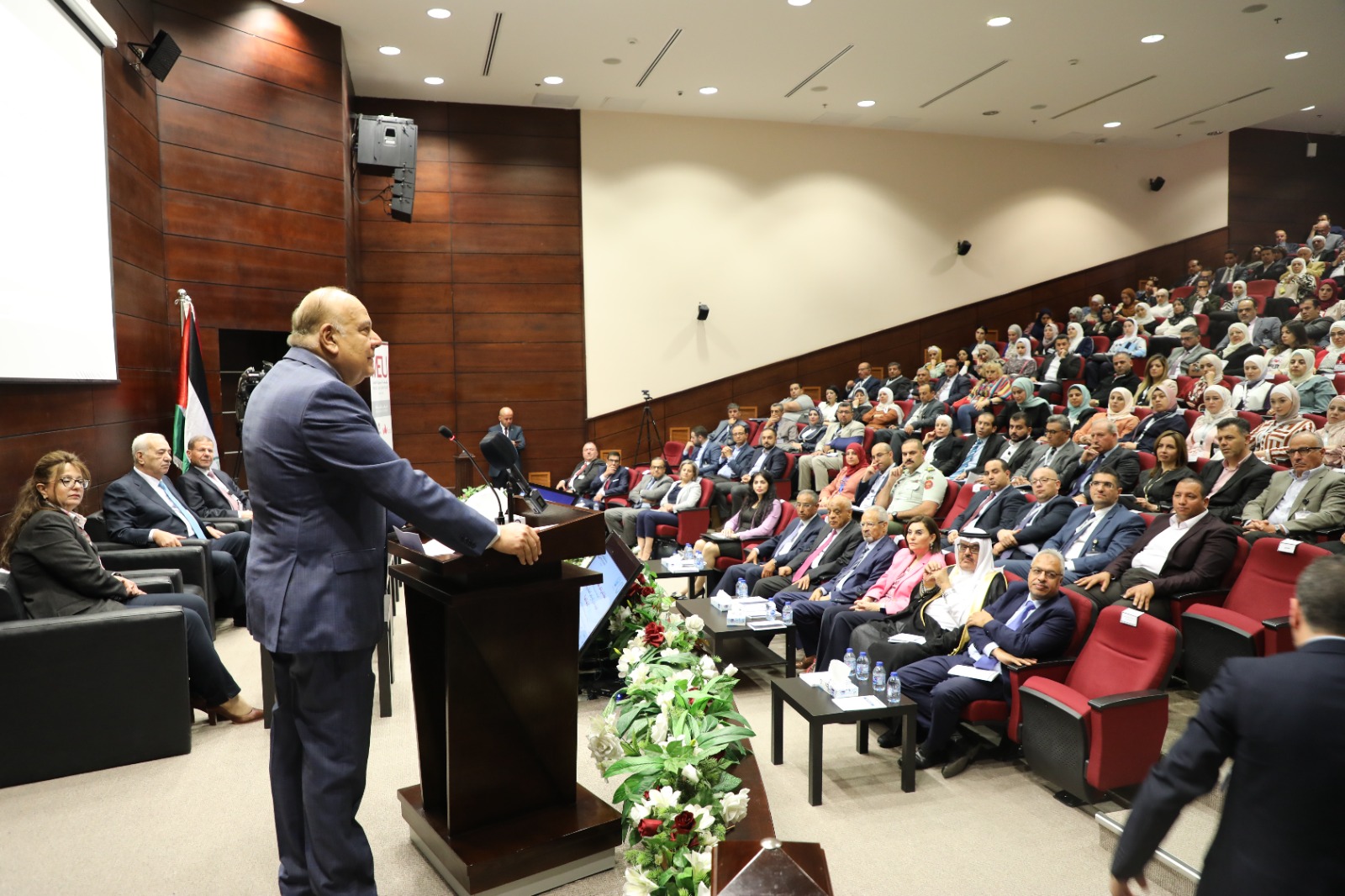
Amman - The 4th international conference for strategic awareness and governance was launched at the Middle East University, under the auspices of the Secretary-General of the Arab Universities Governance Council, the Chairman of the University Board of Trustees, Prof. Yacoub Nasereddin.
Where the conference was organized by the Arab Universities Governance Council and the AArU, in cooperation with the faculties of business, arts, and Educational Sciences.
In his opening speech, Prof. Amr Ezzat Salama, the Secretary General of the Association of Arab Universities (AArU), said that the digital transformation witnessed by the world increases the intensity of competition between universities and the education market significantly, in terms of attracting students, professors, providing digital infrastructure and integration between attendance and distance learning.
Moreover, the conference was also attended by the assistant general secretaries of the AArU, Prof. Dr. Khemissi Hamidi and Prof. Dr. Abdelrahim A. Hunaiti, in addition to the President of the University, Prof. Salam Al-Mahadin, and the chairman and members of the Committee of Education of the Jordanian Senate.
In his part, Prof. Al-Haila said that governance provides a healthy environment for work, by achieving the principle of equality, promoting a culture of dialogue, creating a climate that motivates cooperation and interaction, optimal use of resources, and promoting fair and legitimate accountability with absolute transparency.
Also, he added that the conference committees received 72 papers from 6 countries, namely: Palestine, Iraq, Egypt, Morocco, Oman, and Jordan. He also mentioned 57 papers were accepted after arbitration and distributed to the six conference axes.
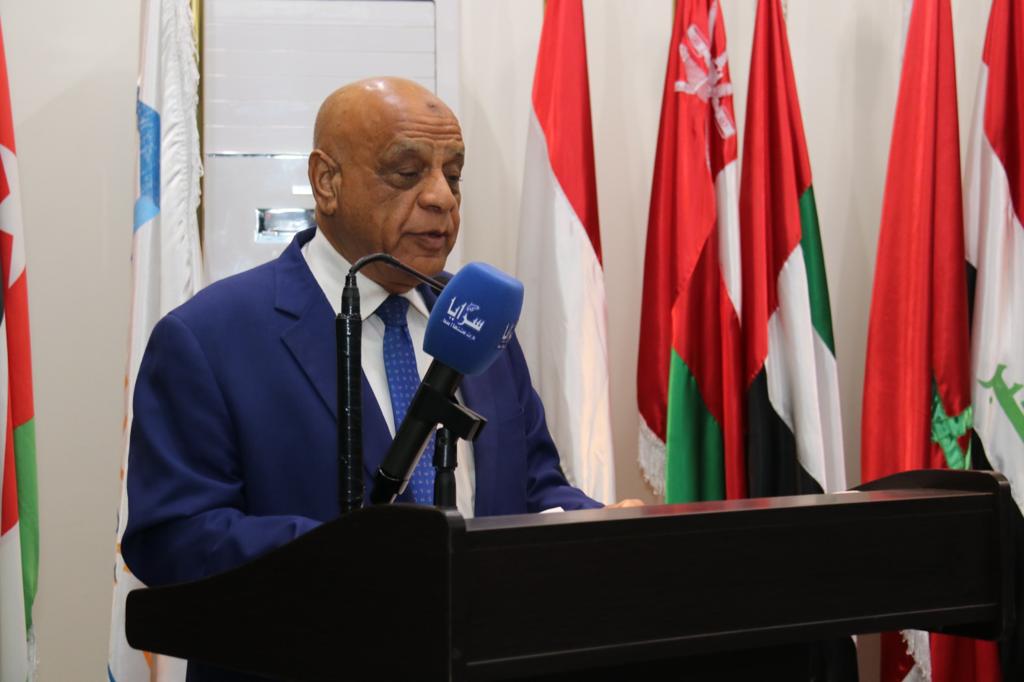
Prof. Abdelrahim A. Hunaiti, the Assistant Secretary-General of the Association of Arab Universities (AArU), participated in the Events of the International Symposium on the role of organizations in achieving sustainable development, which is emanating from the activities of the Arab Council for Sustainable Development held at Amman Arab University.
In the symposium, which was sponsored by Her Highness Princess Basma bint Ali bin Nayef, the topics within the framework of sustainable development were discussed namely: Eradication of poverty and hunger; Good health and well-being; quality education; Gender equality; Clean water and sanitation; Clean and affordable energy; Decent work and economic growth; Industry, innovation and infrastructure، Reducing inequalities.
In his speech, Prof. Hunaiti pointed out the leading role of the AArU towards the values of social responsibility in building partnerships and collaborations to serve Sustainable Development Goals at the local, regional and international levels, as universities are an important part in building global and regional partnerships in order to achieve the Sustainable Development Goals.
Moreover, He pointed out that the AArU members expressed their support for the efforts and initiatives undertaken by the United Nations in this regard as outlined in the 2023 plan, adding that Amman Arab University is one of the leading universities in adopting the Sustainable Development Goals approved by the United Nations as a global call to action to end poverty, protect the planet and ensure that all people enjoy peace and prosperity by 2023.
In his part, Prof. Mohammed Al-Wadyan, the chairman of the Sustainable Development Council and the President of Amman Arab University, stressed that holding such seminars at the University on the most important current issues comes within its activities and in order to achieve its vision, mission and national role in cooperation with other community sectors by providing the students with various intellectual, political, social and economic trends, especially raising their awareness of the most important issues and topics related. Especially raising their awareness of the most important issues and topics related to humans and the environment with regard to the sustainability of their life in balance with the preservation of environmental resources.
During the Symposium, several sessions were held during which a number of researchers and experts spoke on several topics that dealt with the role of local and international organizations in achieving Sustainable Development Goals, and then introducing the Arab Council for sustainable development, in addition to the role of universities specifically in achieving the Sustainable Development Goals.
.png)
The general secretary of AArU, Dr. Amr Salama, on behalf of his colleagues the presidents of the universities, and the AArU family, extend his deepest sympathies and condolences over devastating earthquake victims in Syria and Turkey. Sadly, thousands of victims perished as a result of this massive earthquake, which left thousands wounded and injured.
In his part, Prof. Salama offers his deepest condolences to the victims and their families for what they lost and also hopes for a speedy recovery of those injured. He stressed that providing relief and assistance to the victims is a national and humanitarian duty at all levels. Moreover, he praises the efforts made by Arab countries for reducing the suffering of Syrian people by quickly dispatching emergency teams and providing medical and in-kind assistance to the Syrian people, especially in Aleppo city and the areas affected by earthquakes.
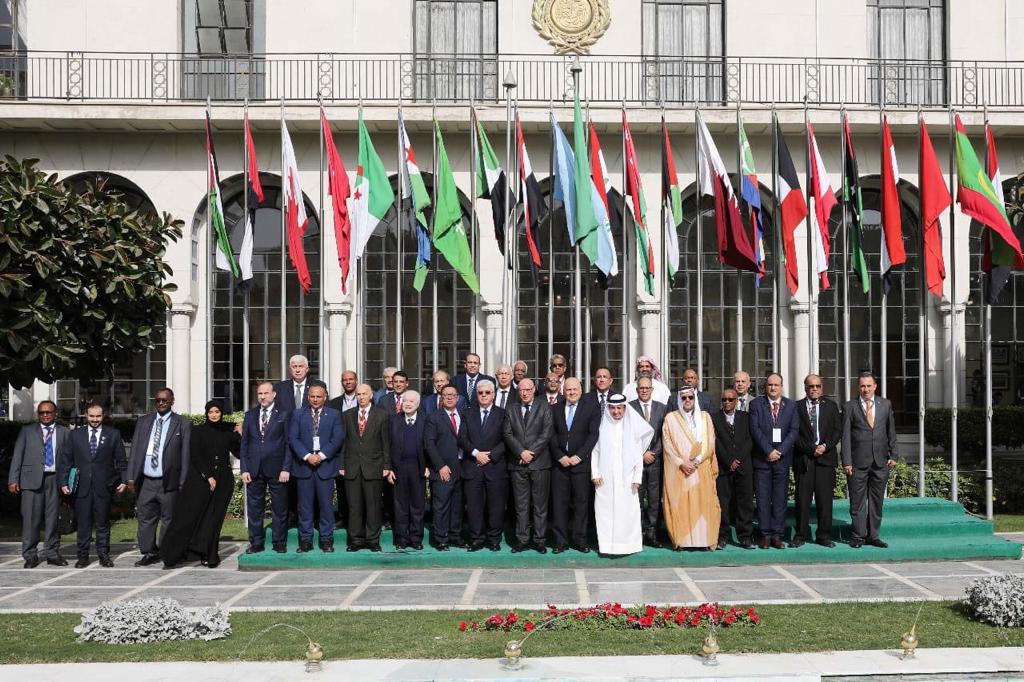
Prof. Amr Ezzat Salama, the Secretary General of AArU, participated in the 44th ordinary session of the Federation of Arab Scientific Research Councils (FASRC), which is organized by the Arab League in cooperation with the Academy of Scientific Research and Technology and FASRC. This meeting was held in the presence of Minister of Higher Education and Scientific Research Ayman Ashour, Prof. Abdelmajid Benamara, the Secretary General of the Federation of Arab Scientific Research Councils (FASRC), Ahmed Rashid Khattabi, the Assistant Secretary General and Supervisor of the Media and Communication Sector at the Arab League Ambassador, Dr. Talal Abu-Ghazaleh, the Chairman of the Arab States Research and Education Network. Chairman of the Arab Organization for Quality Assurance in Education, Dr. Mohamed Bouhicha, the representative of the Algerian Minister of Higher Education and Scientific Research, the President of the 43rd ordinary session of the Federation of Arab Scientific Research Councils, Dr. Mahmoud Saqr, the President of the Academy of Scientific Research and Technology and President of the 44th ordinary session of the Council of the Federation of Arab Scientific Research Councils, the representatives of member states, the heads of Arab organizations and federations, the presidents of academies, bodies, scientific research centers, and Arab universities, the delegations of member states of the Union Council, and the representatives of specialized Arab organizations accredited diplomatic missions at the Arab Republic of Egypt at the headquarters of the League of Arab States.
In his speech, Prof. Salama stressed the importance of close cooperation and collaboration with the Federation of Scientific Research Councils and the participation of the private sector in scientific research. Prof. Salama confirmed that more efforts must be made for collective action, especially since Arab universities represent more than 70% of scientific research output in the Arab world.
He referred to the projects carried out by AArU through the Scientific Research Fund in cooperation with various organizations and unions, including the Arab Ranking for Universities, and the Arab Journals Platform AJP for scientific publishing. Moreover, he indicated that the Federation of Arab Scientific Research Councils will assist 22 scientific research journals from the Arab region to participate in the AJP.
Conducted a specialized training workshop targeting editors-in-chief of academic journals, which introduce the basic steps needed to meet indexing requirements that journals should have to be indexed in international journal databases such as Scopus, entitled “Important Steps for Indexing Journals in Scopus”.
As part of the Arab Journals Platform (AJP) project events and workshops, AJP conducted a series of interactive workshops for editors and researchers, where this workshop was held in the headquarter of AArU. More precisely, the AJP project was established in 2018 through the cooperation between AArU and Elsevier. In this project, journals are hosted in AJP and evaluated by the AJP team and the Strategic Journal Council of AArU under the Scopus criteria. Intensively, the journals were led to follow up on the Scopus criteria and encouraged to be indexed in Scopus.
Prof. Dr. Abdelrahim A. Hunaiti, the Assistant Secretary-General of the Association of Arab Universities (AArU) and the Director of the Quality Assurance and Accreditation Council, welcomed all the participants especially Prof. Abdelmajid Benamara, the Secretary General of the Federation of Arab Scientific Research Councils (FASRC), and the two instructors, Prof. Mahmoud Abdelaty, the founder of Arab Impact Factor (AIF), and Mr. Wael Mansour, the Regional Customer Consultant Research Intelligence in Elsevier. Moreover, he pointed out the importance of scientific publishing, and he also highlighted the role of AArU in helping Arab journals to be on the right track of indexing and encouraging and preparing them to be indexed in international databases.
In his part, Prof. Benamara stressed the necessity for improving and increasing scientific publishing, and also he mentioned the importance of the strategic and financial support of scientific research. He also thanked AArU for offering such workshops that serve in developing scientific research in the Arabic region.
In her part, Dr. Omayya Murad, the AJP Project Manager, presented a full presentation about the AJP project and highlighted its brilliant aims. Murad encouraged the Arab journals to participate in the AJP project to improve their journals’ quality and to follow the international criteria of indexing journals. She also highlighted the AJP Project achievements mainly the recent indexing of An-Najah University Journal for Research - B (Humanities) in Scopus. This journal has participated in the AJP project since October 2020, was evaluated and trained by the AJP team, and then indexed in Scopus in August 2022
On the other hand, Prof. Mahmoud Abdulaty, presented a series of presentations describing and introducing the criteria of several international and Arabic databases such as Scopus, Calrivate, AIF, Arabic Citation Index (ARCI), and Arab Citation & Impact Factor (Arcif).
Moreover, in his speech, Mr. Wael Mansour presented a practical example of a journal submission process in Scopus, and he explained the whole process by going through all the required steps.
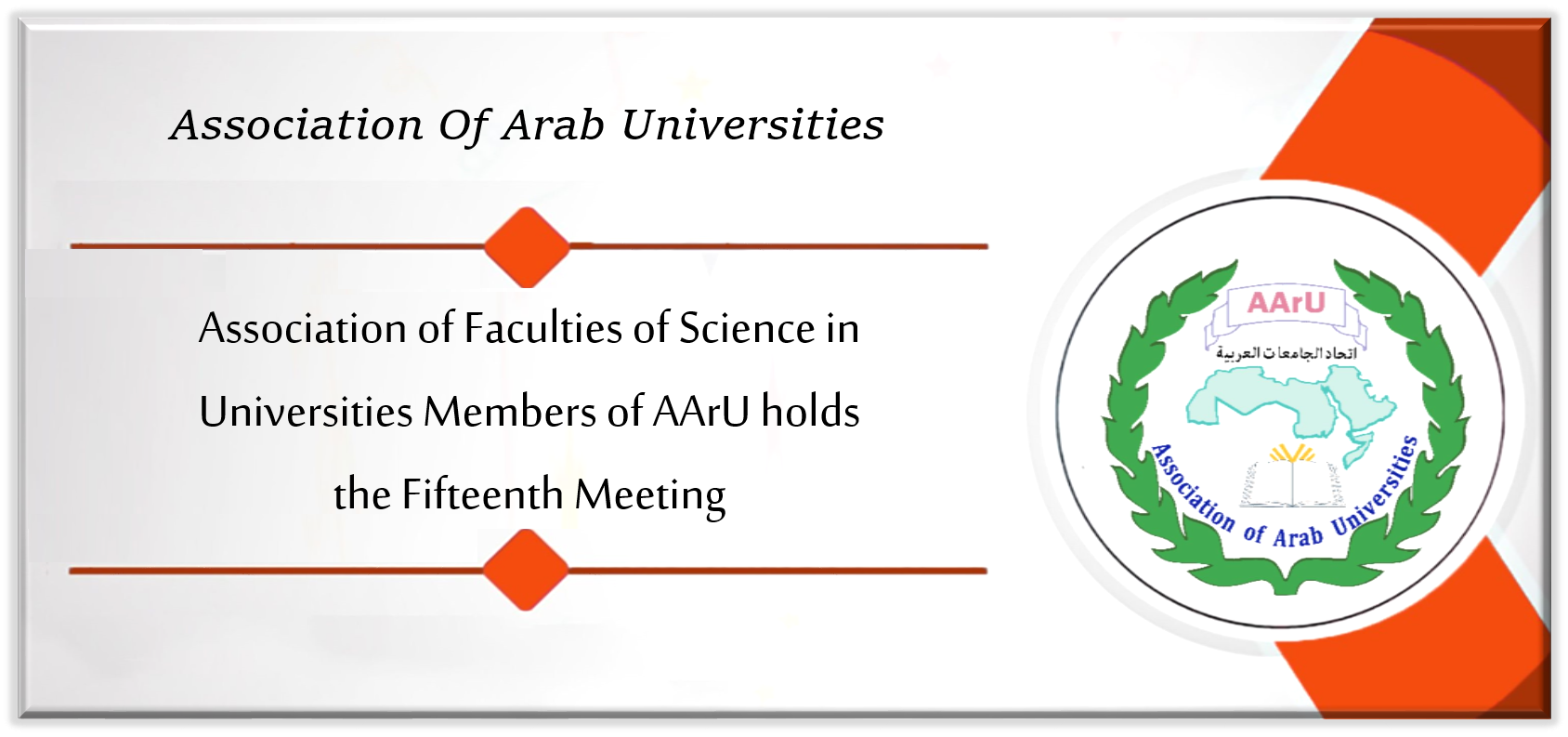
In the presence of Prof. Khemissi Hamidi, the Assistant Secretary General of AArU, the Association of Faculties of Science in Universities of AArU members held their fifteenth meeting, the meeting was attended by 13 deans of the Faculty of Science of the association members.
In this meeting, the participant’s decided to create an executive committee of the association, which holds 9 deans of the Faculty of Science of the association members. They also agreed to conduct a virtual conference specialized on the following issues energy, climate change and food. In this meeting, they assigned the conference organization committee to start preparing for the conference, which will be held under the patronage of the Secretary General of AArU.
In this meeting, participants discussed the ways of encouraging students to be enrolled in majors in the faculties of science and improving the collage programs to manipulate the labor market requirements.
Finally, the Secretary General of the Association thanked all participants for their efforts and expressed his sincere thanks for Prof. Khemissi for the great efforts he provided for the association especially on improving the journal of the association titled as “Arab Journal of Basic and Applied Sciences”.
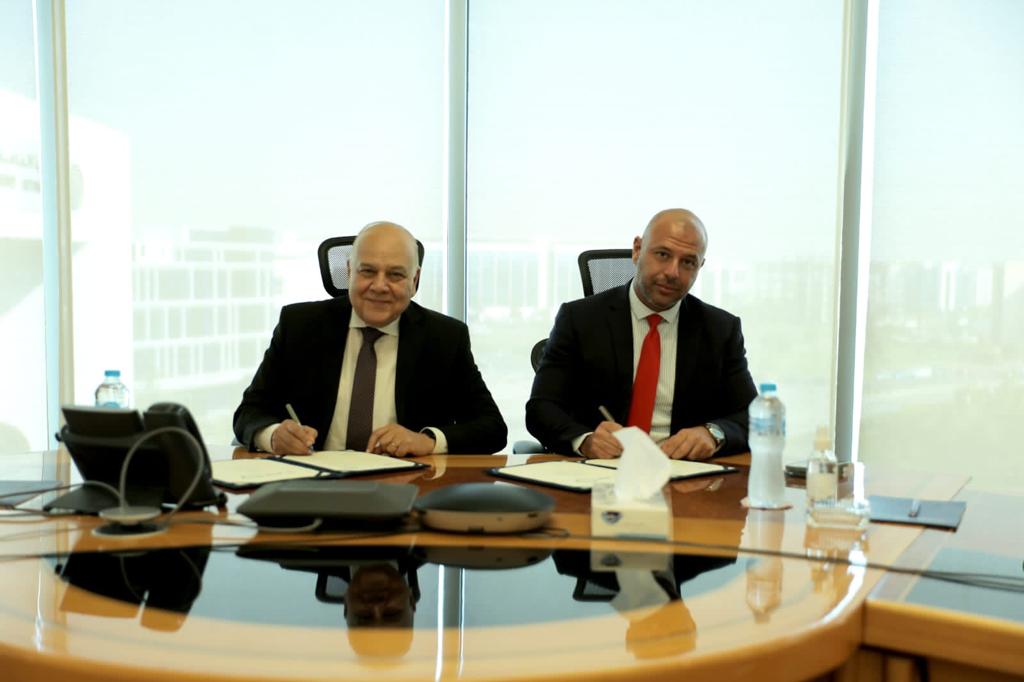
AArU signs a memorandum of understanding with Federation of Arab Capital Markets to enhance cooperation between the two parties to meet the culture of investment in the financial markets at the student level.
The memorandum was signed by Prof. Amr Ezzat Salama, the Secretary General of AArU, and Mr. Ramy Aldakkani, the representative of the Federation of Arab Capital Markets, which aims to increase the collaboration with Arab universities targeting improving the content related to Capital Markets.
Moreover, this memorandum aims to level up the awareness of financial markets among Arab students and Faculty members by organizing specialized workshops and training courses. It also aims to develop academic capabilities working in the field of Arab financial markets.
In this memorandum, both parties are responsible for preparing reports and joint studies dealing with development issues and coordination in international gatherings and frameworks related to financial markets.

Prof. Amr Ezzat Salama, the Secretary General of AArU, said that it is noteworthy that the unemployment rate among graduates in the Arab region is about 28%. In his speech, in the 23rd International Arab Conference on Information Technology hosted by Al Ain University – UAE and in the presence of Ms. Lina Albitar, the Administrative Director of AArU, Prof. Salama mentioned the number of required jobs needed in Arab region is about 60 million jobs during the next 3 decades, also he mentioned that 50% of the traditional jobs will be disappeared from the worldwide. Moreover, new job opportunities will be emerged that relies on informatics, creativity, innovation and entrepreneurship.
On the other hand, he mentioned that higher education institutions are forced to include informatics in their education programs, and it should be a basic part in the process of education to improve the institution outcomes regarding the labor market requirements and maintain the requirements of sustainability.
.png)
The commission of Erasmus+ program in Amman lunched the call for the Call for Proposals for Erasmus+ 2023, where the lunching meeting held in the University of Jordan. In particularly, the program will continue to support the movement of school pupils, higher education and vocational education and training (VET) students, adult learners, young people in non-formal learning programs, educators and staff across borders and towards a European educational and training experience. Form the AArU side, Prof. Waleed Salameh, the AArU consultant, and Ms. Lina Albitar, the Administrative Director of AArU, participated this lunching, and highlighted the importance of these programs and the workshops related to them, where these programs are very helpful for higher education institutions specially in Arab region. Also, they pay attention of the impact of this program in building the human capabilities and the academic advancement of the current programs, which will be similar to the European programs and have same quality level. In Erasmus+ 2021-2027, 30% of the budget will be invested in cooperation projects and policy development activities where organizations gain experience in international cooperation, strengthen their capacities, produce innovative approaches, exchange good practices and network.
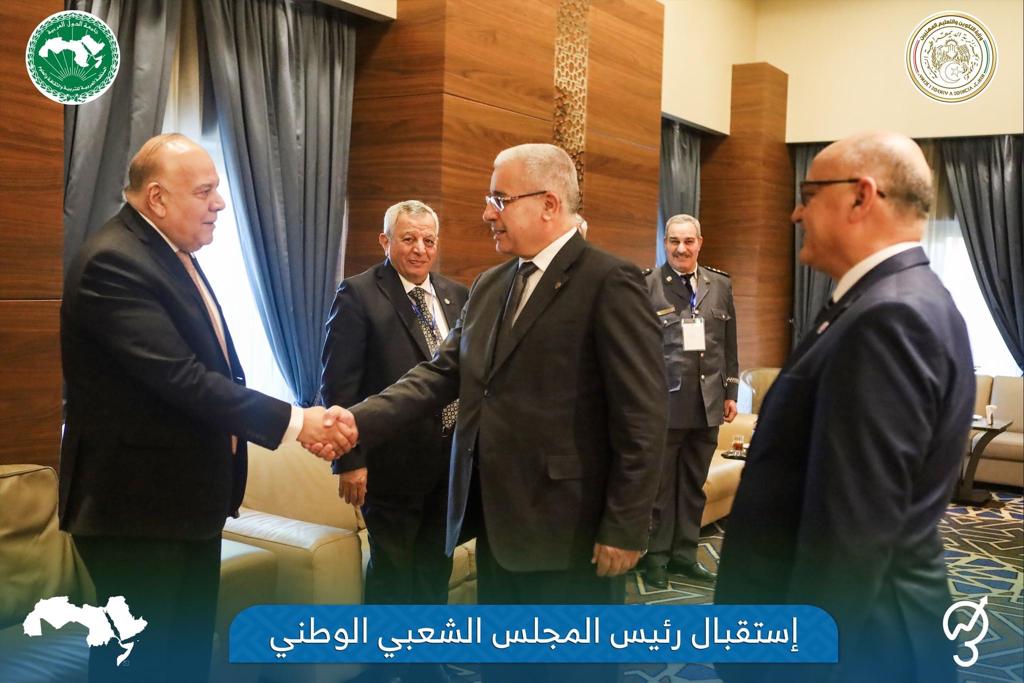
On December 26-2022, Prof. Amr Ezzat Salama, the Secretary General of AArU, participated in the Third Conference of Ministers of Leaders Responsible for Technical and Vocational Education and Training in the Arab World held in the International Conference Center in Algiers.
The conference was organized by ALECSO, the Arab League's Educational, Cultural and Scientific Organization, in cooperation with Algerian Ministry of Vocational Education and Training. It was attended by several international experts in the field of technical and vocational education and training.
In his part, Salama invited the Arab youth to drive into the technical and vocational training, hence to avoid high rates of unemployment in the Arab countries. He also invited Arab universities to develop their outcomes in line with labor market requirements.
On the other hand, Salama mentioned that Arab universities provided several research projects in medical, engineering, basic, social sciences, water, environmental and energy sectors. They also provided new joint projects and established several technology incubators.
Finally, he thanked and appreciated the effort and the interest provided by the Algerian country.
In his part, Prof. Waleed Salameh, the AArU Consultant, presented the Arab Qualification Framework that is hosted by AArU in cooperation with ALECSO. This framework aims to develop a Regional and Arab Qualification Framework AQF came from its believes that it is of its due time because of its importance, enhance and add value to the project process and final output, the AArU policy and technical document and action plan, create and share knowledge: contribute to creating common understanding and concepts of qualifications frameworks and systems, share experiences: disseminate information on the state of play, good practice and experiences of QFs on the Arab Countries and across the globe.
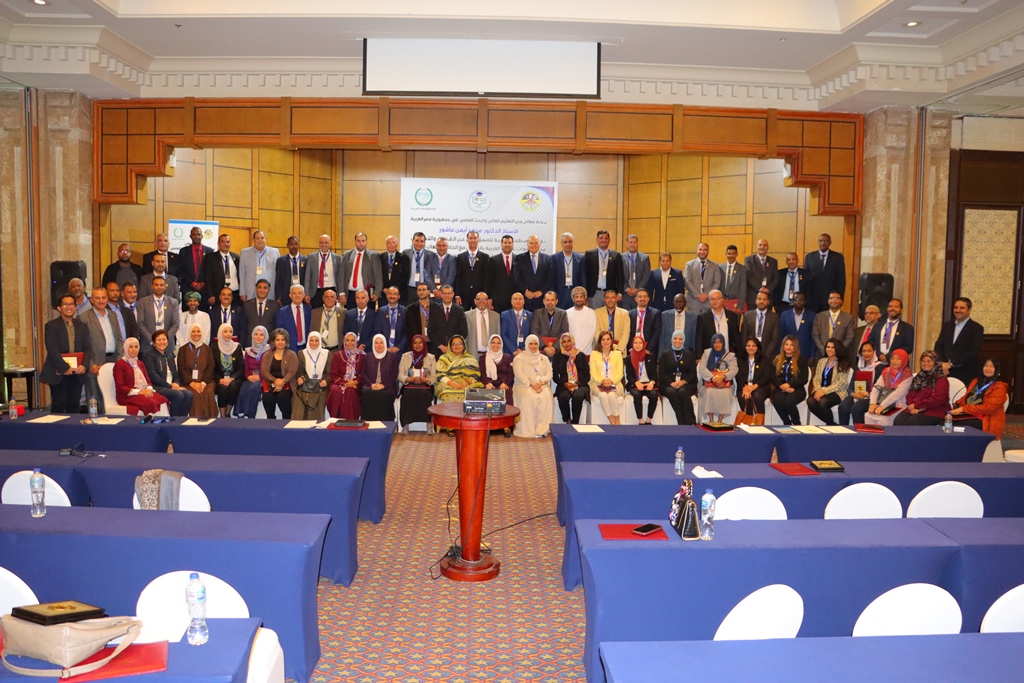
Under the auspices of His Excellency the Secretary General of the Association of Arab Universities, Prof. Amr Ezzat Salama, the activities of the 39th conference of the Arab Organization for Admission and Registration Officials in the Arab Countries, sponsored by the League of Arab States, under the motto "Admission and Registration: Reality - Ambition - Challenges" in the period from 12-15 December 2022, in Sharm El-Sheikhw, were concluded. There was participation from more than 70 universities and 135 researchers worldwide.
In his speech, Prof Bassam Al-Mahadin, the Secretary General of the Arab Organization for Those Responsible for Admission and Registration in Universities in the Arab countries, stressed the importance of this annual conference and mentioned the effective and continuous cooperation between the organization and AArU.
In particular, Dr. Mohammad Malkawi, the AArU Consultant, presented a special session about the Counterfeit Combat Technology (CCT) system, which aims to protect documents issued from universities or institutions against fraud and counterfeiting with real-time authentication and verification, where the CCT system provides all protection methods and applications required for protecting documents.

Prof. Amr Ezzat Salama, the Secretary General of AArU, participated in the International Conference on Laws, Regulations, Legislation, Policies and Language Planning conference activities, where the conference was held under the auspices of the Arab League, in partnership with Arab and international organizations and bodies. In fact, the conference was held on the occasion of World Arabic Language Day.
In his speech, Prof. Salama stressed the great efforts and interest provided by AArU to improve higher education in the Arab region, especially in the field of scientific research and publishing, digitalization, capacity building, and quality assurance. He also displays the Arab Impact Factor (AIF) project that is sponsored by AArU, where this project aims to deal with Arabic publications. AIF provides specific criteria for evaluating Arabic journals and indexing them, which encourages them to be at the same level as international journals.
Moreover, Salama said that AArU is the main sponsor of the International Council for the Arabic Language, and it is also hosting the TANAL project. Put sufficiently, TANAL is a unique program of providing a Certificate of International Proficiency in the Arabic Language for non-Arabic speakers.
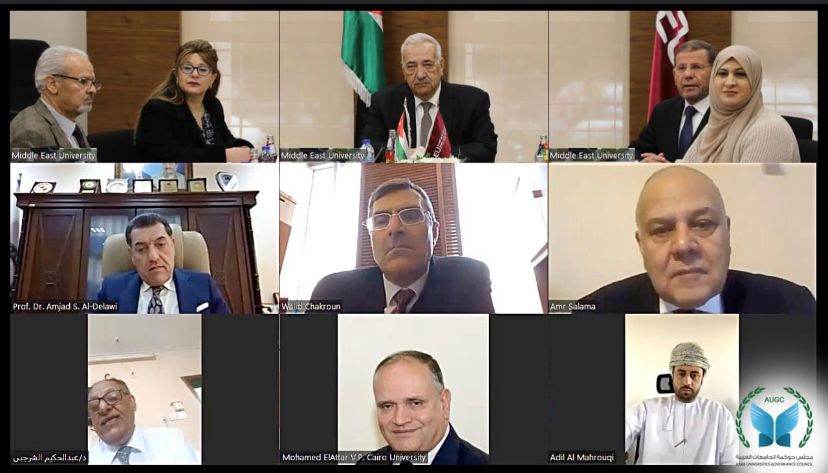
Conducted its 2nd meeting virtually for the members of the Board of Directors. The meeting was held in the presence of Prof. Amr Ezzat Salama, the Secretary General of AArU, Prof. Yaquob Naseredin, the Head of Arab Universities Governance Council, Prof Khemissi Hamidi, the Assistant Secretary General of AArU, Prof. Salam Al-Mahadeen, the President of Middle East University-Jordan, Prof. Mohammad Al-Hila, the Council Manager, the Presidents of the council members Universities, and Ms. Dina Abu Rizziq from AArU side.
The council is planning to organize the 4th Strategic Awareness and Governance Conference to be held in May 2023 and to prepare for the Dr. Yacoub Nasereddin Award for best research in the field of university governance in the principles and indicators of Arab university governance.
In his speech, Prof. Salama pointed out that the aim of this meeting is also to prepare the Arab Universities Governance Council Guide.
In his part, Prof. Khemissi mentioned the importance of this guide is concentrated on setting new and specific standards for the Governance Council.
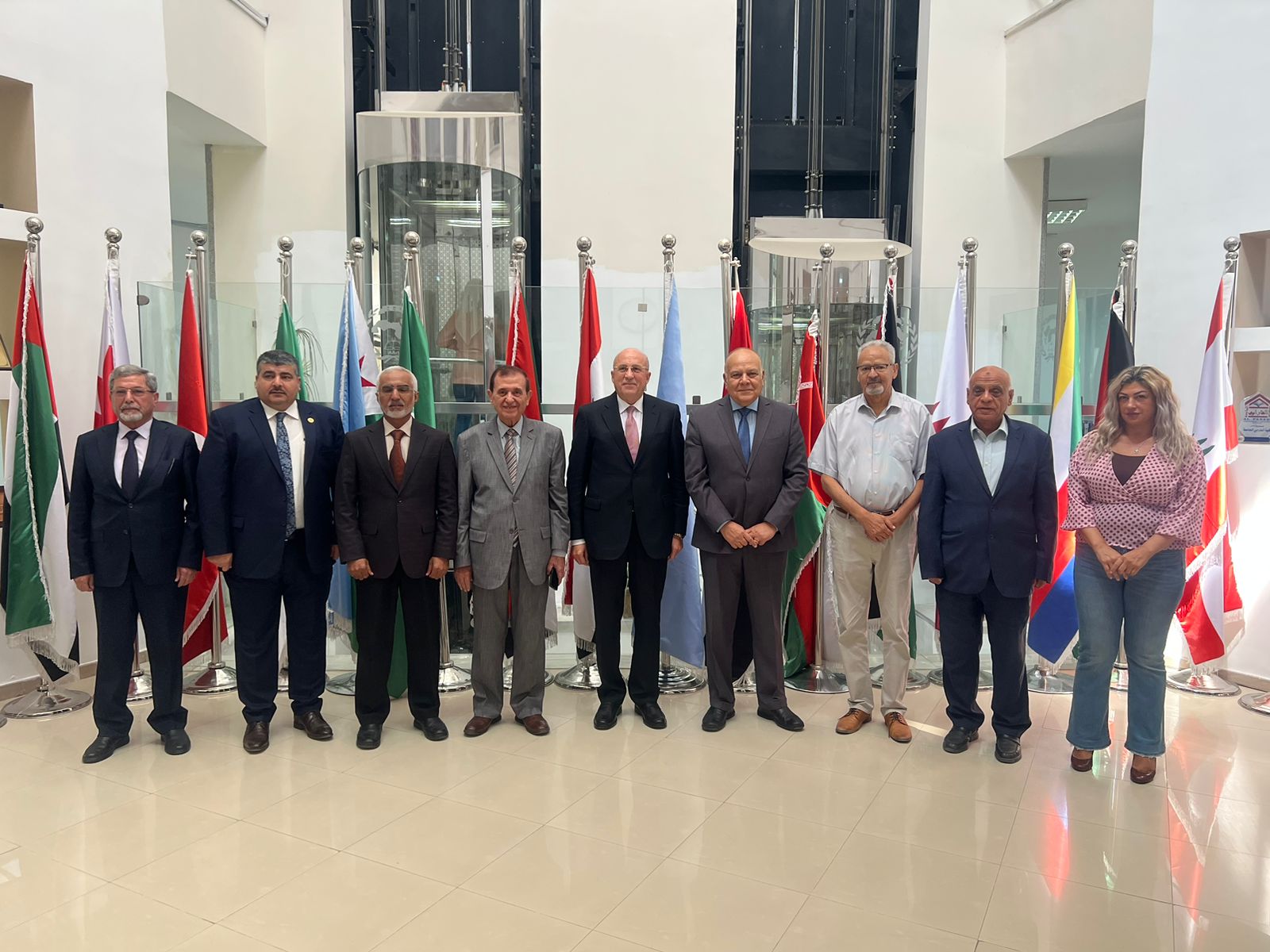
Prof Amr Salama, the Secretary General of AArU, receives the delegation of the Arab Board of Health Specializations in AArU headquarter in the presence of Dr. Omar Al-Rawas. Secretary General at Arab Board of Health Specializations, Dr. Adel El-Adaway, the head of the Arab board of the orthopedic surgery in the health specialization council; and some members of the council. Also, Prof. Khamisi Hamidi, Assistant Secretary General of AArU; Professor Abdelrahim A. Hunaiti, the Assistant secretary General of AArU; and Mrs. Lina Al-Bitar, the Director of Public Administration in AArU attended the meeting.
On his part, Dr. El-Adaway gave a brief about the health specialization council, and then he proposed some cooperation issues between the health specialization council and AArU members in the health field. Hence, a cooperation agreement will be signed in the recent future between both sides to start up new collaboration projects that improve the medical and scientific levels in Arab universities.
On the other hand, Prof. Salama welcomed and thanked the delegation members for this visit, and he highlighted the importance and great efforts provided by the council. Moreover, Salama gave a brief about AArU that holds 450 university and 36 councils, also he mentioned several achievements of AArU. He added, fortunately there are many ways of cooperation between AArU and the health specialization council.
Dr. Al-Rawas pointed out the importance of the council in maintaining the scientific and professional level of doctors in various medical specialties by applying the qualitative exam provided by the health specialization council. This exam is being held frequently to obtain the Arab Board, where the Arab Board is accredited internationally. Thousands of medical students attend this exam within different specializations. Also, this board has executive offices in several Arab countries. Regarding the huge relations of AArU with many international associations and institutions, thus AArU can help in improving this council.
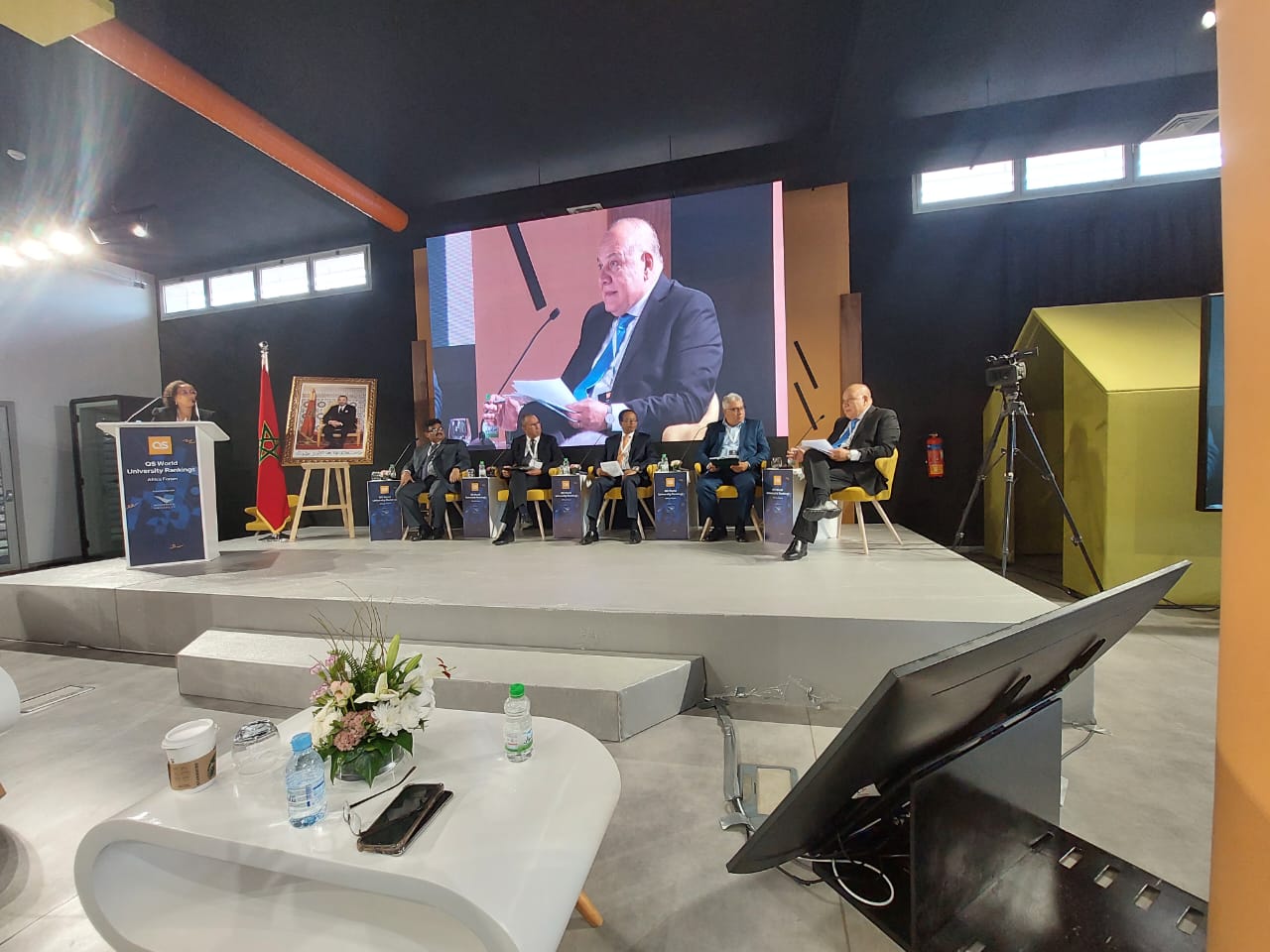
The Secretary-General of AArU, Prof. Amr Ezzat Salama, said that the estimated the number of students enrolled in higher education institutions in various countries of the world is about 230 million, of whom 15 million are in African universities. In his speech, in African Forum for Insertional Classification – held in the Mohammed VI Multidisciplinary University in Morocco, Prof Salama showed that less than a third of students African universities registered in Science, Technology, Engineering and Mathematics majors.
Also, he mentioned that according to the latest UNESCO Science Report for 2021, Africa spends only 0.59 of its GPD on scientific research and development, compared to the global average spend of 1.79 percent.
On the other hand, Salama added that despite the increment in the number of universities, human development and sustainable development have not been positively affected in Africa. However, unemployment rates have risen because they have not kept pace with the needs of the labor market.
Subsequently, Salama indicated that the real challenge for Africa is the ability to develop the

Prof Salama, the Secretary General of AArU, praised the Arab universities that got high rank in the Shanghai Academic Ranking. Nineteen distinguished universities from seven Arab countries are ranked highly in the Shanghai Academic Ranking. Their names are as follows according to their countries; Egypt: Cairo University Mansoura University, Alexandria University, Ain Shams University, Al-Azhar University, Zagazig University, and Kafrelsheikh University; Kingdom of Saudi Arabia: King Abdulaziz University, King Saud University, King Fahd University of Petroleum and Minerals, King Khalid University, Taif University and Prince Sattam bin Abdulaziz University; Jordan: The University of Jordan; Oman: Sultan Qaboos University; Qatar: Qatar University; United Arab Emirates: Khalifa University; and Lebanon: American University of Beirut.
Salama assured that the increment in the number of Arab universities that are highly ranked in international academic rankings is a clear indication of the valuable interest of the administrations of these universities in improving their research and scientific level, and it is a great indication that they are on the right track to improve their universities. As this improvement will have a significant impact on the outputs of universities.
.png)
GLOBAL UNIVERSITY ASSOCIATIONS FORUM
PRESS STATEMENT
On 17 May in Barcelona, the Global University Associations Forum (GUAF) was formally constituted. The Forum brings together representatives of university associations in Africa, the Americas, the Arab region, Asia and Europe. The focus of this first physical meeting of Forum members, chaired by EUA and hosted by University Ramon Llull, was on enabling international collaboration and exchange in higher education.
At this inaugural meeting, Forum members shared their experiences of and visions for enabling international collaboration and exchange. Pathways and mechanisms for fostering collaborative practices were considered in the context of student and researcher mobility, universities’ contribution to achieving goals set out in the UN Sustainable Development Goals (SDGs), associations’ respective continental and regional development aspirations as well as the influence of geopolitical factors.
Creating and sustaining frameworks that promote exchange across higher education and research systems is a pivotal step towards safeguarding the future of our communities and our planet. Without robust structures for collaboration in research and education at global scale, society will be ill-equipped to tackle climate change, protect the environment, pursue the global health of its citizens and move collectively towards building sustainable societies and circular economies.
The Forum agreed on a number of actions for follow-up: It will
· promote the role of the higher education sector – and more specifically, its capacity to facilitate international exchange and collaboration – in working towards the SDGs and other continental and regional development regimes; to date, the sector’s role in achieving SDG goals has not been widely acknowledged and does not feature sufficiently in government strategies;
· emphasise respect for fundamental values, such as institutional autonomy and academic freedom, as critical in building sufficient scope and decision-making power to engage in international collaboration;
· commit to sharing resources – including policies, guidelines and data – on topics of mutual interest among Forum members to facilitate coherent collective action on key matters at a global level;
· address the obstacles inhibiting mobility at institutional and national levels;
· explore how Forum member associations can contribute to the establishment of collaborative (virtual) learning approaches.
About the Global University Associations Forum
The Global University Associations Forum was conceived in 2020 in response to the disruption caused by the Covid-19 pandemic to international higher education and research collaboration. It was established to complement the ongoing exchange and collaboration initiatives developed by universities, and their national networks and associations. It will identify pathways for joint action to further enhance links between university associations and their relationships with member institutions. In addition, the Forum will advocate for the vital role of partnerships as a vehicle for pursuing joint actions within and across regions.
The Global University Associations Forum is constituted by the following organisations:
Africa |
Association of African Universities (AAU) |
Arab region |
Association of Arab Universities (AArU) |
China |
China Association of Higher Education (CAHE) |
Europe |
European University Association (EUA) |
India |
Association of Indian Universities (AIU) |
Latin America & The Caribbean |
Latin American & The Caribbean Space for Higher Education (ENLACES) |
North America |
American Council on Education (ACE) & Universities Canada (UC) |
Southeast Asia |
ASEAN University Network (AUN) |
As a collective voice, the Forum will work towards achieving consensus by engaging in dialogue. Through joint statement and action, it will contribute to the advancement of the sector both in regional and global terms.
The next physical meeting of the Forum will take place in 2023 in ASEAN, under the chairmanship of AUN. In the interim, members will continue to convene virtually to establish next steps for implementing priority actions.

In cooperation with the World Islamic Sciences and Education University, the specialized workshop for Nigerian students from Majma’ Research & Training institution – Lagos was concluded in AArU headquarters on Thursday 23-06-2022.
The workshop was held at the AArU headquarters, was organized in cooperation with experts from faculty members of the World Islamic Sciences and Education University, and was attended by number of professors, media professionals and students from Majma’ Research & Training institution – Lagos – Nigeria.
The workshop was held in accordance with the policies and objectives of AArU, where Prof. Amr Salama, the Secretary General of AArU, indicated in his statements that one of the main objectives of AArU mission is to consolidate the true image of the true Islamic religion.
During the graduation ceremony, Prof. Khemissi Hamidi, the Assistant secretary General of AArU, thanks the World Islamic Sciences and Education University and Majma’ Research & Training institution teams for their fruitful cooperation in organizing this workshop. Where the graduation ceremony was held in the campus of the World Islamic Sciences and Education University, that in presence of Prof Mohamad Al-khalaileh, the president of the World Islamic Sciences and Education University, the Nigerian ambassador in Amman, and Prof. Saeed Al-Refaie ,the Secretary General of Majma’ Research & Training institution. Moreover, the ceremony was attended by number of AArU administrative staff, and Collage deans and faculty members of the university.
In his part, Prof Al-khalaileh highlighted the great efforts provided by AArU in helping educational institutions for more international collaboration.
One more, Prof Al-Refaie pointed out his thankful and appreciations for AArU team for the great efforts and facilities provided by the AArU team for the international educational institutions.

The Secretary General of AArU, HE Prof Amr Ezzat Salama, met with Oman's Minister of Higher Education, Research and Innovation, Prof. Rahma bint Ibrahim Al Mahrooqi. In this meeting, Prof Salama highlighted the Sultanate of Oman’s educational developments, such as; enhancing the quality of education; and choosing new majors regarding the labor market needs. On the other hand, Prof Salama mentioned the efforts provided by AArU to enhance cooperation between AArU and all Ministries of Higher Education in the Arabic region. Prof. Salama also highlighted the AArU academic and scientific in the current period and the next decade within the AArU strategic plan 2030, such as; Arab Ranking for Universities; Arab qualifications framework; Arab Impact Factor, and Arab Journals Platform hosted by digital commons.
In her part, HE Prof Al Mahrooqi pointed out Oman Vision 2040, and also mentioned the importance the collaboration between Arab academic institutions. On the other hand, Prof Al Mahrooqi presented some of the ministry projects, which focuses on training national cadres through workshops, training sessions, capacity-building programs, and scholarships. In particular, Prof. Al Mahrooqi will continue to encourage all Omani universities to enrich their cooperation with AArU.
During the meeting, the President of the University of Jordan (UJ), Prof. Nathir Obeidat, presented the UJ activities, programs, projects, and plans, and discussed the aspects of cooperation between the two parties. Also, Prof. Fawaz Zgoul, the head of The Arab Council for Training Students of Arab Universities (ACTSAU), and Eng. Jihad alkharraz, Administrative Assistant of the ACTSAU, attended this meeting.

